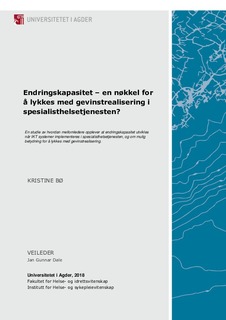| dc.contributor.author | Bø, Kristine | |
| dc.date.accessioned | 2018-09-18T13:02:52Z | |
| dc.date.available | 2018-09-18T13:02:52Z | |
| dc.date.issued | 2018 | |
| dc.identifier.uri | http://hdl.handle.net/11250/2563239 | |
| dc.description | Masteroppgave i helse- og sosialinformatikk HSI500 - Universitetet i Agder 2018 | nb_NO |
| dc.description.abstract | Background: If an organisation is to reap the potential benefits of new technology, it must modify its work processes. However, the specialist health service appears to be experiencing significant challenges because it is constantly under pressure to change and improve its efficiency. This can weaken its capacity for change and, at worst, lead to long-term reductions in productivity and efficiency.
Purpose: The purpose of this study is to examine how middle managers in the specialist health service feel they can influence developments in change capacity. The aim is to contribute to an awareness of the importance of change capacity as a means of achieving success in benefits management during ICT systems implementation.
Selection and method: A qualitative study was conducted at a hospital in Norway, involving interviews with 10 middle managers. Semi-structured interviews were prepared based on the theory of change capacity developed by Meyer & Stensakers (2006).
Findings: The study showed that the informants experienced change fatigue and that there was little focus on developing change capacity within the organisation. They also felt that they had little influence and co-determination, and some of them did not always understand why changes were being made. The informants realised that prioritisation was their responsibility, and that little attention was paid to resources above and beyond budgetary frameworks when changes were implemented. The majority described a daily round with scant help and support towards changing work processes, and complained there was no requirement to evaluate and follow-up of benefits when, for example, ICT systems were implemented. Conclusion: The study concludes that the informants felt they did not develop a capacity for change. An increased awareness of the factors that enhance change capacity in positive directions may be important for achieving success in connection with continuous change processes and benefits management.
Keywords: Change capacity, Benefits management, Middle management, Organisational change, Health informatics. | nb_NO |
| dc.language.iso | nob | nb_NO |
| dc.publisher | Universitetet i Agder ; University of Agder | nb_NO |
| dc.rights | Attribution-NonCommercial-NoDerivatives 4.0 Internasjonal | * |
| dc.rights.uri | http://creativecommons.org/licenses/by-nc-nd/4.0/deed.no | * |
| dc.subject | HSI500 | nb_NO |
| dc.subject | Change capacity | nb_NO |
| dc.subject | Benefits management | nb_NO |
| dc.subject | Middle management | nb_NO |
| dc.subject | Organisational change | nb_NO |
| dc.subject | Health informatics | nb_NO |
| dc.subject | Endringskapasitet | nb_NO |
| dc.subject | gevinstrealisering | nb_NO |
| dc.subject | mellomledere | nb_NO |
| dc.subject | organisasjonsendring | nb_NO |
| dc.subject | helseinformatikk. | nb_NO |
| dc.title | Endringskapasitet – en nøkkel for å lykkes med gevinstrealisering i spesialisthelsetjenesten? : En studie av hvordan mellomledere opplever at endringskapasitet utvikles når IKT systemer implementeres i spesialisthelsetjenesten, og om mulig betydning for å lykkes med gevinstrealisering | nb_NO |
| dc.type | Master thesis | nb_NO |
| dc.subject.nsi | VDP::Teknologi: 500::Informasjons- og kommunikasjonsteknologi: 550 | nb_NO |
| dc.subject.nsi | VDP::Samfunnsvitenskap: 200::Statsvitenskap og organisasjonsteori: 240 | nb_NO |
| dc.source.pagenumber | 104 s. | nb_NO |

